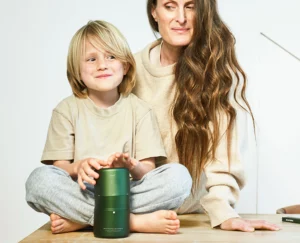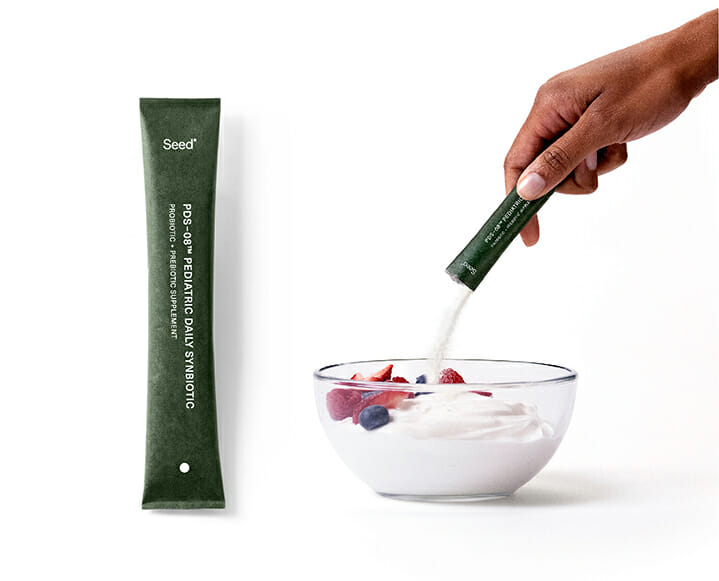
Ready for a science lesson on your child's microbiome? Ara Katz is the author of A Kids Book About Your Microbiome and the co-founder of cutting-edge probiotic brand, Seed. Today marks the brand's launch of a ground-breaking new product for kids aged 3 to 17, PDS-08™ Pediatric Daily Synbiotic—a scientifically-validated 2-in-1 powder with 9 probiotic strains and a fiber-based prebiotic blend.
Together with immunologist and Seed Scientific Advisor, Azza Gadir, PhD, Ara breaks down all the important things you should know about your children's microbiome from birth through snack time.
We've been fascinated to learn about our own microbiome health over the years and were amazed to learn everything Ara and Azza are sharing about what's really going on inside those tiny tummies.
You can learn more about Seed's new PDS-08™ Pediatric Daily Synbiotic HERE. Designed with busy parents in mind, the 30-day monthly supply comes in a refillable BacTrac™ container with a built-in daily tracking system so you never miss a day. The powder is free from 14 classes of allergens and formulated with strains that support digestive, gut immune, dermatological, and respiratory health. PDS-08™ is also studied to support regularity and offers 5 grams of prebiotic fiber per servingto help bridge your child's fiber gap.
An Intro On Microbiome Development Through Early Childhood
The first microbes you’re exposed to—through a process called seeding—are generally your mother’s—through birth, skin-to-skin contact, and breastfeeding practices.
Seeding begins at birth (though some researchers believe some of this early microbial exposure and other factors that could impact seeding may even happen before birth) and continues through early infancy and child development (especially in the gastrointestinal tract).
From the day seeding begins, many factors influence the development of your microbiome including:
+ Maternal microbiome, diet and lifestyle choices
+ Mode of birth, either vaginal or c-section
+ Early exposure to antibiotics
+ Breastfeeding / nourishment practices
+ Environmental factors like living in an urban environment versus continuous exposure to nature
Early nutrition
For the first three years of life, other external factors like where you live, people you interact with, family and friends—and even pets, can contribute to a child’s developing microbiome. These foundational microbes play an essential role in training and regulating the early immune system.
Between the ages of 3-5, your microbiome begins to stabilize into what’s called a “steady state microbiome.” And just as each genome is unique, each individual microbiome is unique.
Despite the fact that your dominant species should remain relatively unchanged from this stage forward, other factors like diet, exercise, medicine, and sleep can continue to influence the composition and function of your microbiome for the rest of your life.
Training Healthy Immunity: The Gut + Immunity Connection
Similarly, the immune system is highly complex, adaptable, cooperative, and personal. It is profoundly intertwined with the body as a whole, and can be affected by everything from hormone levels to sleep to our microbes, which live in and on us.
Your body is complex and interconnected and the gut sits at the core of it all. Think of it as the switchboard of communication.
The intimate relationship between the gut and your immune system is known as the gut-immune axis. They are connected through a variety of pathways, including immune cells, hormones, and important compounds such as short-chain fatty acids (SCFAs)—a product of bacterial fermentation.
A well-supported gut microbiome supports healthy gut immune function and 'cross-talk' between your immune and intestinal cells.
Disturbances to the bacteria in your gut may impact immunological responses in the GI tract, which could in turn lead to gastrointestinal disorders.
This also works the other way, in that disturbances to your immune system can also impact your gut microbiome
6 Keys To Supporting Children’s Microbiome During Development
a Plant-based Diet | One of the most impactful ways you can nurture the trillions of microbes that work hard to keep your child healthy is through diet and nutrition.
A diet with a wide (diverse) variety of plants—like fruits, vegetables, nuts, and seeds—are super important for your microbes. They feed your microbes to help them do the important work in your body. An overload of sugar and processed food can hurt the balance of the gut microbiome, which makes it hard to digest food and for a child’s immune system to function.
Microbiome research has demonstrated some clear and actionable dietary guidelines:
+ High abundance of diverse sources of plant fibers and polyphenols (like vegetables, walnuts, pomegranates and berries)
+ High intake of fiber and microbiota-accessible carbohydrates (like broccoli, Brussels sprouts, beans and sweet potatoes)
+ High intake of Omega-3 fatty acids and monounsaturated fat (like salmon, sardines, avocados and olive oil)
+ Low in sugar, preservative agents, processed foods, food additives
+ Low in saturated fat
An overload of sugar and processed food can hurt the balance of the gut microbiome, which makes it hard to digest food and for a child’s immune system to function. Though the science is still growing, minimizing processed foods where possible and offering your child a diet that includes a variety of fruits and vegetables can support a healthy and diverse microbiome.
good Sleep | Get quality sleep. Microbes follow their own circadian rhythms, and a regular sleep schedule keeps them happy. Rest helps them stay in balance, and they can even help your child sleep more soundly.
Interestingly, sleep deficit has been linked to lower richness and diversity of helpful bacteria in the gut, as well a reduction in those SCFA-producing bacteria we discussed earlier, which play a key role in immune function regulation.
enjoy Nature + pets | Go outside and play! When your child is outside, they are exposed to many different microbes. Some scientific theories posit that greater contact with environmental microbes can supplement our own protective microbiota, participating in immune functioning and helping to build adaptive immunity. A recent study among daycare children found that increasing the biodiversity of their outdoor environment to be more representative of nature, positively impacted the children’s gut and skin microbiomes, which in turn, affected their immune system. Some scientists believe that increased exposure to nature may even help prevent allergies and asthma attacks. A handful of dirt can contain billions of microbes—so encourage your kids to get a little dirty!
Enjoy time with pets (if they’re not allergic!). Pets have their own unique microbes, just like us! Pets carry lots of microbes that are different from ours and can help teach your child’s body what’s OK and what might make them sick.
Brush those teeth | The mouth is the second most diverse part of the body (after the gut), with over 700 types of bacteria that work to prevent smelly breath, cavities and make sure nothing harmful finds a place to live. Regular brushing helps keep the mouth microbiome in balance—and a balanced mouth microbiome can even protect other parts of the body, like the heart and lungs!
keep Learning | Learn to nurture your microbiome:. Given the critical nature of the microbiome to health, learning what it is, what it does, and how best to nurture it is fundamental. As so many of us are children of the antibiotics generation (read: brought up to believe all bacteria are bad), the microbiome offers a powerful new way to understand ourselves, our bodies, and the choices we make for our families. Books like A Kids Book About the Microbiome are a great way to introduce kids - and ourselves - to the invisible world in and around us so we can make the daily choices that help them, help us!
take Probiotics | Probiotics are scientifically defined as beneficial microbes that have been shown through scientific research to provide specific health benefits. Specific strains have been studied in children for a variety of benefits for gastrointestinal health, antibiotic-associated diarrhea, dermatological conditions and more. It’s important to research specific strains and learn more about the products you purchase, as not all probiotics are created equal.
Seed is known for our adult synbiotic, DS-01, and now, our PDS-08, a clinically-studied 2-in-1 powdered synbiotic, formulated for ages 3-17 with 9 probiotic strains and a fiber-based prebiotic blend.
The post 7 Things Every Parent Should Understand About Their Child’s Microbiome appeared first on The Chalkboard.
from The Chalkboard https://ift.tt/YTo1cw9
via IFTTT


No comments:
Post a Comment